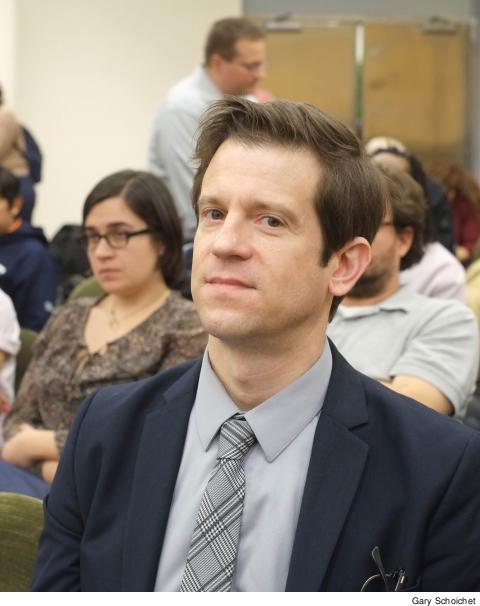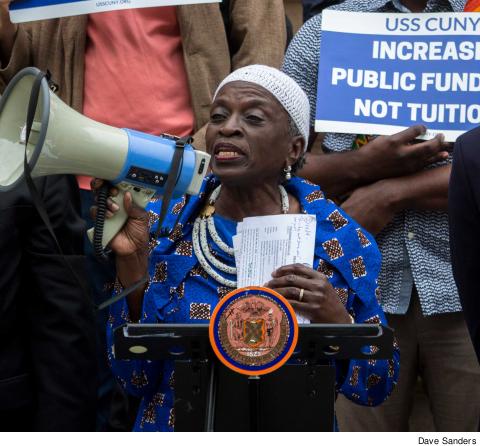PSC: Use federal funds
The PSC and other CUNY advocates have demanded that the University use $455 million in new federal COVID-19 aid – on top of the $251 million the University received in CARES Act money last year – to “keep class sections open and allow students to enroll,” according to a union statement.
In a press conference January 26, PSC members noted that at various campuses students were unable to attend the classes they needed to graduate due to both “Bursar’s holds” (when the administration keeps a student from enrolling or registering for courses due to that student’s outstanding balance, even a small one) and the lifting of class-size minimums, thus creating a rationale for college administrations to shut down classes that “fail” to reach their inflated minimum enrollment numbers.
ENROLLMENT BLOCKS
J. Paul Narkunas, an associate professor of English at John Jay College, called these blockades to enrollment “stupefying” when the University has the federal money to keep these students enrolled in the courses they need. He added, “CUNY has willfully chosen not to help these students,” adding that the administration’s decisions “will make students suffer.” Narkunas said that due to class-size minimums being increased, in his department alone 20 sections were slashed before the start of the Spring semester, with another 10 currently on the chopping block despite the $7.66 million the college has received in federal stimulus money.
 |
George Sanchez, PSC chapter chair at College of Staten Island, said, “The money is there, no one should be getting cut.” He added that CUNY should put “a moratorium on the Bursar’s holds.”
Inez Barron, chair of the City Council Higher Education Committee, said, “We know there is additional federal stimulus money coming….Why is this happening?”
 |
The situation affects campuses across the city, and the union worries that these cuts could lead to adjunct job losses in the future. The union said in a statement, “Kingsborough Community College administrators have identified up to 30% of spring courses for possible cancellation and point to Bursar’s holds as a cause. Brooklyn College’s School of Humanities and Social Sciences has been pushed to raise course enrollment minimums by 33%, a change that will lead to severe reductions in courses. At York College more than 1,000 students are barred from enrollment because they owe small amounts of money to the college.”
CANCELLED CLASSES
Immanuel Ness, chair of the political science department at Brooklyn College, decried the college administration’s decision to lift class-size minimums and the resulting class cancellations. Ness noted that in addition to putting students in a position where they cannot take the classes they need, these soaring class-size minimums threaten the quality of education at the college.
“To have a class of 30, 35 or more is just unfeasible and not pedagogically sound,” Ness said. “You’re not getting your college education.”
But perhaps no one described the Kafkaesque situation better than Hunter College senior Tyrese Spruill, who due to a Bursar hold will not graduate at the end of the Spring semester as previously scheduled. Having to use “spotty” internet on a computer that he shares with multiple members of his household, Spruill, a creative writing major, was never able to receive clear communication from the college about his financial aid. In short, his graduation has been delayed by the chaos of distance learning and fumbling by the Hunter administration.
“I am stuck in limbo in terms of not being able to put in my classes because of the Bursar’s hold, and being unable to know whether my financial aid has gone through or not simply because of a piece of paperwork,” Spruill said. “Now that I’ve implemented this paperwork twice, I have not received any sort of information explaining [whether] it has been received or that it’s being looked over or that anything is changing for my current predicament.”
LARGER CLASSES
The union does not know how many students are in the situation Spruill is in, but the union believes that the problem is occurring throughout the CUNY system. Calling the situation “cruel” and “unforgivable,” PSC President Barbara Bowen told reporters, “CUNY should not be putting obstacles in front of our students.” She said in a statement, “This is absolutely the wrong moment to enlarge classes and risk causing another round of mass layoffs of adjuncts at CUNY. The University should be using the federal relief funds to restore adjunct staff and faculty positions, not to throw more New Yorkers into unemployment. The PSC calls on the CUNY administration: Lift the holds, keep the classes running, and let our students and the communities that depend on them have a chance to rebuild their lives through access to college education.”
AID TO STUDENTS
The CUNY administration responded in a statement that since last Spring, it has “disbursed over $118 million in student emergency grants to more than 161,000 students,” and that an “additional $118 million in aid to students will be allocated shortly, using federal Coronavirus Response and Relief Supplemental Appropriations Act funds.”
It continued, “This aid to students is being supplemented by $9 million the Chancellor’s Emergency Relief Fund raised through private and corporate philanthropy. The Chancellor’s Emergency Relief Fund was established in April to help students who have experienced job losses and other financial setbacks during the pandemic. The fund has so far awarded $500 grants to more than 9,000 students, prioritizing undocumented students and international students who were precluded under the CARES Act from receiving aid.”
Noting that some of that money had been allocated to purchasing laptops and enhancing technology for distance learning, CUNY said that “The balance of CARES Act and CRRSAA funding will be allocated directly to the campuses for student support and mental health services and to reimburse colleges for COVID-19-related costs, such as refunds, among other priorities identified by the University’s community and senior colleges and professional schools and programs.”

